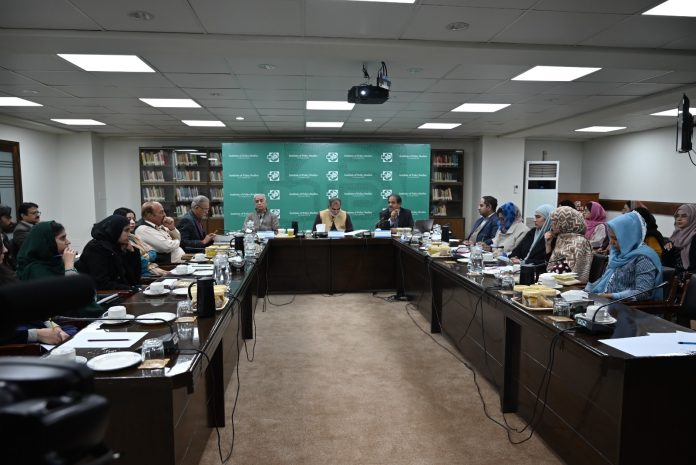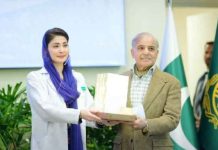DNA
Islamabad, February 6: Pakistan’s blue economy holds transformative potential as a strategic economic driver. However, unlocking it hinges on key enablers, i.e., political backing, policy continuity, and institutional coordination, along with overcoming bureaucratic inertia, policy stagnation, and infrastructure gaps. This needs a proactive approach focused on strengthening governance and fostering synergies.
This was observed during a roundtable discussion titled “Navigating Pakistan’s Blue Economy: Strategic Insights and Future Roadmap,” held at the Institute of Policy Studies (IPS), Islamabad.
The session was addressed as guest of honor by Vice Admiral (r) Iftikhar Ahmed Rao, former SAPM maritime affairs, and as keynote speaker by Cdre (r) Muhammad Jawad Akhtar, former advisor maritime affairs, Planning Commission, Khalid Rahman, chairman IPS, Dr Usman Chohan, advisor, Center for Aerospace and Strategic Studies (CASS), Prof Dr Azhar Ahmad, senior analyst, Muhammad Wasim Khan, former DG, Marine Fisheries Department, and Cdre (r) Muhammad Obaidullah, maritime and defense analyst.
Vice Admiral (r) Iftikhar Rao briefed on the National Maritime Policy (NMP) 2025, highlighting recently endorsed structural, operational, and strategic reforms proposed by the Task Force on Revamping Pakistan’s Maritime Sector. He emphasized that Pakistan’s maritime future hinges on the effective implementation of the reforms and welcomed the growing awareness of maritime and blue economy discourse, stressing its importance for national economic resilience.
Cdre (r) Jawad Akhtar delivered a detailed presentation on NMP 2025 and stressed that to drive maritime transformation, the targets must include enhancing the capacity of the Ministry of Maritime Affairs and FBR, aligning policies with actionable directives, increasing transit trade and transshipment volumes, third-party audits, and reviving Pasni Harbor. However, he warned that delays in approvals, technological and infrastructure gaps, resistance to privatization, capacity constraints, geopolitical trade barriers, and sustainability concerns remain major hurdles.
He said the NMP 2025 task force must continue monitoring progress and addressing bottlenecks efficiently to ensure successful implementation. Moreover, a phased approach to major reforms will help manage risks while securing early successes to build momentum. He stressed that the task force should engage with international port operators for knowledge transfer and technological integration, collaborate with labor unions to ensure fair labor practices in privatization, and strengthen the maritime linkages within URAAN Pakistan. These are essential practices for sustaining long-term growth and competitiveness in the sector.
Cdre (r) Obaidullah criticized the imposition of a 33% tax on the maritime sector in 2023, arguing that it reduces Pakistan’s competitiveness in the global market, especially when tax-free incentives were in place in the 2001 policy.
A major hurdle in maritime policy implementation is a lack of political will, said Cdre (r) Obaidullah. He noted that none of the major political parties prioritize maritime affairs in their manifestos. Without political backing, there would be policy stagnation, and a cycle of forming task forces would continue without meaningful action.
Endorsing this, Dr Azhar Ahmad highlighted the need for a shift in policymaking mindset and culture. To transform the blue economy into a tangible economic driver, a forward-looking approach to long-term policy sustainability, inclusion of dedicated experts and intelligentsia, building institutional memory, developing synergy among various maritime authorities, and policy follow-up mechanisms must be ensured.
Wasim Khan said the NMP 2025 appears to be a mere rewording of the 2001 policy rather than a comprehensive overhaul. He stressed that Pakistan’s fisheries sector requires urgent technological investment and structured governance mechanisms to boost aquaculture exports and sustainability.
The challenges of the maritime sector are fundamentally rooted in bureaucratic inertia and outdated colonial-era structures, said Dr Usman Chohan. He argued that many inefficiencies persist by design, favoring status quo interests over modernization and empowerment of new-generation professionals. However, he noted that the discourse around the blue economy has significantly evolved, creating a window of opportunity for institutional reform.
In concluding remarks, Khalid Rahman reiterated that Pakistan’s blue economy remains underutilized due to governance failures that extend beyond a single sector. As such, there must be a deliberate effort to link policy with action across multiple domains to realize its full potential.
Moreover, he stated that national consciousness on maritime affairs must be cultivated, particularly among youth who actively engage with digital platforms. #

















